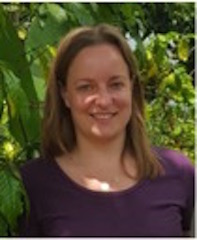
Qualifications
- Professional: Postgraduate Certificate in Higher Education (Fellow of the Higher Education Academy)
2016 - Professional: Diploma in Community Based Adaptation to Climate Change
Center for Sustainable Development, 2012 - MSc: International Natural Resource Development
University of Wales, Bangor, 2008 - BA: Anthropology
University of Wales, Lampeter, 2006
Teaching and Supervision
I previously taught on the following MSc level modules: DDL-4004 Agroforestry Systems & Practices; DXX-4505 Natural Resource Management; DXX-4527 Research Planning & Communication; DXX-4019 Natural Resource Development; DXX-4538 Forestry Field Course; DDL-4545 Tropical Forestry Study Tour.
I was module organiser for DDL-4004 Agroforestry Systems & Practices and DXX-4019 Natural Resource Development.
From 2008-2018, I supervised MSc student dissertation projects with a local knowledge/livelihood/food security focus and were associated with World Agroforestry Centre-led projects.
I was personal tutor for distance learning MSc Tropical Forestry students from 2017-2018.
Research Interests
From 2007-2018, I was involved in international research and development projects led by the World Agroforestry Centre and focusing on smallholder farming systems and livelihoods in the tropics. I specialised in local agro-ecological knowledge and understanding local contexts to inform the design of agroforestry-based development interventions aiming to meet livelihood needs as well as reduce land degradation processes.
My PhD research focuses on the integration of trees in agricultural landscapes in the highlands of Central Kenya and Eastern Uganda. Identifying the reasons for planting/maintaining trees on farms and their contribution to household food security.
Publications
2022
- PublishedFarmers’ perspectives and context are key for the success and sustainability of farmer-managed natural regeneration (FMNR) in northeastern Ghana
Kandel, M., Anghileri, D., Alare, R. S., Lovett, P. N., Agaba, G., Addoah, T. & Schreckenberg, K., Oct 2022, In: World Development. 158, 106014.
Research output: Contribution to journal › Article › peer-review - PublishedTen people-centered rules for socially sustainable ecosystem restoration
Elias, M., Kandel, M., Mansourian, S., Meinzen-Dick, R., Crossland, M., Joshi, D., Kariuki, J., Lee, L. C., McElwee, P., Sen, A., Sigman, E., Singh, R., Adamczyk, E. M., Addoah, T., Agaba, G., Alare, R. S., Anderson, W., Arulingam, I., Bellis, S. K. V., Birner, R., De Silva, S., Dubois, M., Duraisami, M., Featherstone, M., Gallant, B., Hakhu, A., Irvine, R., Kiura, E., Magaju, C., McDougall, C., McNeill, G. D., Nagendra, H., Nghi, T. H., Okamoto, D. K., Valencia, A. M. P., Pagella, T., Pontier, O., Post, M., Saunders, G. W., Schreckenberg, K., Shelar, K., Sinclair, F., Gautam, R. S., Spindel, N. B., Unnikrishnan, H., Wilson, G. T. G. N. N. & Winowiecki, L., 1 May 2022, In: Restoration Ecology. 30, 4, e13574.
Research output: Contribution to journal › Article › peer-review
2021
- PublishedAssessing Social Equity in Farmer-Managed Natural Regeneration (FMNR) Interventions: Findings from Ghana
Kandel, M., Agaba, G., Alare, R. S., Addoah, T. & Schreckenberg, K., 1 Mar 2021, In: ECOLOGICAL RESTORATION. 39, 1-2, p. 64-76
Research output: Contribution to journal › Article › peer-review
2020
- PublishedScalable and equitable governance in farmer managed natural regeneration
Kandel, M., Benamba, C., Alare, R., Agaba, G. & Schreckenberg, K., 1 Dec 2020, ETFRN News, p. 169-176.
Research output: Contribution to specialist publication › Article
2019
- PublishedThe utility of farmer ranking of tree attributes for selecting companion trees in coffee production systems
Dumont, E. S., Gassner, A., Agaba, G., Nansamba, R. & Sinclair, F., Aug 2019, In: Agroforestry Systems. 93, 4, p. 1469-1483
Research output: Contribution to journal › Article › peer-review
2017
- PublishedUsing local knowledge to understand challenges and opportunities for enhancing agricultural productivity of smallholder farming systems in Western Kenya
Mutemi, M., Njenga, M., Lamond, G., Kuria, A., Öborn, I., Muriuki, J. & Sinclair, F., 17 Feb 2017, Sustainable Intensification in Smallholder Agriculture: An Integrated Systems Research Approach. Öborn, I., Atta-Krah, K., Phillips, M., Thomas, R., Vanlauwe, B. & Brooijmans, W. (eds.). London; New York: Earthscan, p. 177-195 419 p.
Research output: Chapter in Book/Report/Conference proceeding › Chapter › peer-review
2016
- PublishedLocal knowledge of tree attributes underpins species selection of coffee farms
Lamond, G., Sandbrook, L., Gassner, A. & Sinclair, F., 31 May 2016, In: Experimental Agriculture.
Research output: Contribution to journal › Article › peer-review - PublishedLocal knowledge reveals the important roles that trees play in smallholder farming systems in Eastern Uganda
Agaba, G., Le Thi, T. & Agaba, M., 2016, Agriculture for Development, 28, p. 7-9.
Research output: Contribution to specialist publication › Article - PublishedTurning literature into reality - tales from a Bangor University MSc Tropical Forestry summer school in Ghana
Walmsley, J., Brockington, J., Agaba, G. & Rayment, M., 1 Apr 2016, In: Agriculture for Development. 2016, 27, p. 20-22 2 p.
Research output: Contribution to journal › Article › peer-review - PublishedWhat can local knowledge contribute to our understanding of tree species selection on coffee farms?
Agaba, G., Sandbrook, L., Gassner, A. & Sinclair, F., 25 Aug 2016, In: Agriculture for Development. 28, p. 21-25
Research output: Contribution to journal › Article › peer-review
Personal
Since 2010, I have been running a UK based charity in partnership with a community based organisation in Central Kenya. We work together to provide outreach services to orphaned children and their guardians. We take a holistic approach to improve their wellbeing, including supporting with educational costs (e.g. apprenticeships, secondary school, college courses), providing mentorship and counselling through creative therapy workshops, and household level food security projects.
My current position at the Food, Farming & Countryside Commission involves leading their place-based strand of work across the four nations of the UK. The aim is to understand local needs and priorities relating to food, farming, and the countryside and how national policies ‘land’ in different settings. Through meaningful and sustained engagement with stakeholders at different scales and from different sectors, the aim is to transition to a food system based on agroecological principles that meets societal needs without further environmental degradation.
